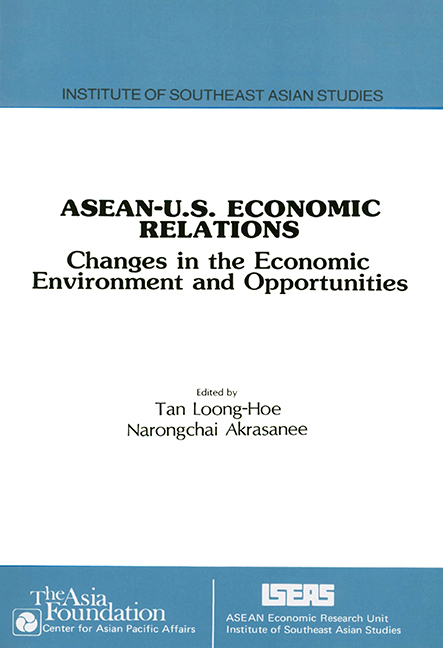Book contents
- Frontmatter
- Contents
- List of Tables
- List of Figures
- Foreword
- Changes in the ASEAN-U.S. Economic Environment and Opportunities: An Introductory Overview
- PART I ECONOMIC TRENDS
- PART II STRUCTURAL ADJUSTMENTS
- PART III TRADE IN SERVICES
- 5 ASEAN-U.S. Trade in Services: An ASEAN Perspective
- 6 U.S.-ASEAN Trade and Investment in Services: An American Viewpoint
- PART IV ROLE OF PRIVATE SECTOR
- THE EDITORS
5 - ASEAN-U.S. Trade in Services: An ASEAN Perspective
from PART III - TRADE IN SERVICES
Published online by Cambridge University Press: 21 October 2015
- Frontmatter
- Contents
- List of Tables
- List of Figures
- Foreword
- Changes in the ASEAN-U.S. Economic Environment and Opportunities: An Introductory Overview
- PART I ECONOMIC TRENDS
- PART II STRUCTURAL ADJUSTMENTS
- PART III TRADE IN SERVICES
- 5 ASEAN-U.S. Trade in Services: An ASEAN Perspective
- 6 U.S.-ASEAN Trade and Investment in Services: An American Viewpoint
- PART IV ROLE OF PRIVATE SECTOR
- THE EDITORS
Summary
There has been a surge of interest in services and services trade in the eighties. This in part stems not only from the recognition of the importance of services in domestic economies and in world trade; but also from the initiative of the world's largest economy – the United States – in focusing on services trade and services trade liberalization in international trade negotiations. To date, the United States has successfully obtained the agreement of the member nations of the General Agreement on Tariffs and Trade (GATT) to include, for the first time, services in the forthcoming new round of multilateral trade negotiations. The objective of this paper is therefore to examine the U.S. position with regard to international transactions in services, and to evaluate the ASEAN stand, stated at the GATT ministerial meeting at Punta del Este, in the light of ASEAN-U.S. services trade relations.
The U.S. Position on Services Trade
The view of the Reagan Administration on international services transactions is summarized in the US National Study on Trade in Services submitted by the U.S. Government to GATT in December 1983. As it currently stands, since the Tokyo Round GATT has not in general included services trade. The rationale for the U.S. initiative to include services is that:
The international exchange of services serves increasingly to stimulate economic growth, and because of this trend services issues are of growing importance to all countries. Furthermore successful structural adjustment of national economies is closely tied to the growth of services within individual economies and to their exchange internationally. Because of these trends services trade issues should be given a more central position in the international trade policy process.… While recognizing that exceptions may exist, the study suggests that: (1) trade in services, like trade in goods, is an engine of growth; (2) liberalized trade in services, as in goods, benefits producers and consumers alike; (3) protectionist measures that hamper trade in services retard every country's economic prospects; and (4) the regulation of some services to achieve national policy goals should be carefully weighed against the economic importance of liberalized competition.
- Type
- Chapter
- Information
- ASEAN-U.S. Economic RelationsChanges in the Economic Environment and Opportunities, pp. 115 - 145Publisher: ISEAS–Yusof Ishak InstitutePrint publication year: 1988

